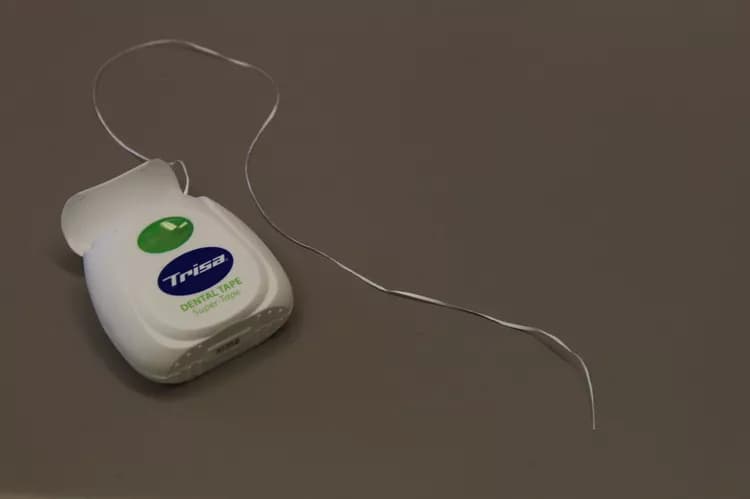Flossing daily can not only improve your oral health, but also your overall wellbeing. Flossing removes plaque from between the teeth that causes cavities that toothbrushes miss. By flossing before brushing your teeth, you can also brush more effectively since toothpaste can get to more parts of your teeth.
Plaque build-up at the gum line can harden and form tartar. Flossing can prevent the plaque and bacteria from getting into the gum line, which causes gum disease and sensitivity. While the visible part of teeth is covered with protective enamel, underneath is the sensitive dentin, which makes up the rest of the teeth that goes into the jaw. At the center of your tooth is the root, which contains nerves and blood vessels.
Plaque and tartar buildup causing cavities and gum disease can deteriorate the protective layers around the root and lead to painful tooth problems. By flossing and brushing, you can prevent these painful oral health problems and save money in the long-term by preventing the need for expensive dental procedures.
Besides improved oral health, regular flossing can also prevent other health problems. According to Mayo Clinic, poor oral health has been linked to endocarditis (infection of the heart inner lining), cardiovascular disease, diabetes, osteoporosis, Alzheimer’s disease, and many more. One of the reasons for this association is the penetration of bad oral bacteria into the bloodstream. In order to maintain good overall health, practicing good oral hygiene, including regular flossing, is imperative.
The health benefits of flossing teeth may include:
- Preventing plaque and tartar build-up, leading to cavities and gum disease
- Protecting the tooth enamel and protective coverings of the roots of your teeth
- Preventing tooth discoloration
- Preventing painful future tooth problems
- Saving money by preventing the need for expensive dental procedures later on
- Helping to reduce the risk for future health conditions including heart disease, diabetes, and endocarditis
There are many ways you can maintain good oral health. One of the most important factors includes getting regular dental checkups and teeth cleaned-up every 6 months. A dentist can check for any signs of gum disease or other tooth problems including cavities. Your dentist can also show you the proper way to brush and how to floss your teeth because overly rigorous brushing can damage tooth enamel.
However, daily care between such dental visits is the only way to keep your mouth, and the rest of your body, healthy. How often should you floss? You should floss and brush your teeth at least twice a day in the morning and at night. It is best to brush after breakfast to remove any food residue that can stick to the teeth and cause cavities. At night, you should brush before going to sleep in order to remove any residual food particles that can also harm your teeth while you sleep.
References:
http://www.nlm.nih.gov/medlineplus/ency/article/001957.htm (accessed on December 23, 2014)
https://www.healthypeople.gov/2020/topics-objectives/topic/oral-health (accessed on December 23, 2014)
http://www.mouthhealthy.org/en/az-topics/f/flossing (accessed on November 26, 2014)
http://www.mayoclinic.org/healthy-living/adult-health/in-depth/dental/art-20047475?pg=1 (accessed on November 26, 2014)
Helpful Peer-Reviewed Medical Articles:
Petersen, P. E. (2003). The World Oral Health Report 2003: continuous improvement of oral health in the 21st century–the approach of the WHO Global Oral Health Programme. Community Dentistry and oral epidemiology,31(s1), 3-24.
Petersen, P. E., & Yamamoto, T. (2005). Improving the oral health of older people: the approach of the WHO Global Oral Health Programme.Community dentistry and oral epidemiology, 33(2), 81-92.
Buglar, M. E., White, K. M., & Robinson, N. G. (2010). The role of self-efficacy in dental patients’ brushing and flossing: testing an extended Health Belief Model. Patient education and counseling, 78(2), 269-272.
Farsi, J. M. A., Farghaly, M. M., & Farsi, N. (2004). Oral health knowledge, attitude and behaviour among Saudi school students in Jeddah city. Journal of dentistry, 32(1), 47-53.
Tufekci, E., Casagrande, Z. A., Lindauer, S. J., Fowler, C. E., & Williams, K. T. (2008). Effectiveness of an essential oil mouthrinse in improving oral health in orthodontic patients. The Angle orthodontist, 78(2), 294-298.
Ciancio, S. (2003). Improving oral health: current considerations. Journal of Clinical Periodontology, 30(s5), 4-6.
Coleman, P., & Watson, N. M. (2006). Oral care provided by certified nursing assistants in nursing homes. Journal of the American Geriatrics Society,54(1), 138-143.
Related Articles
Test Your Knowledge
Asked by users
Related Centers
Related Specialties
Related Physicians
Related Procedures
Related Resources
Join DoveHubs
and connect with fellow professionals


0 Comments
Please log in to post a comment.